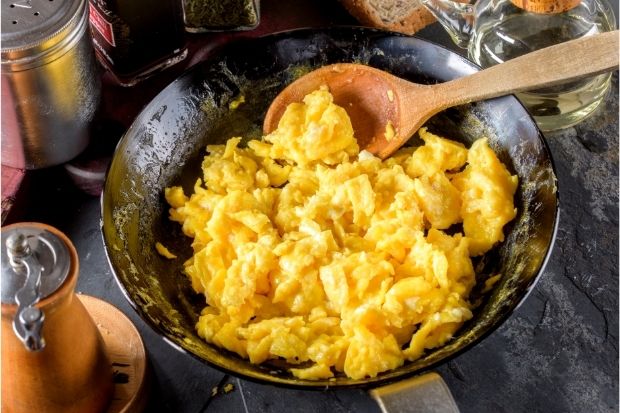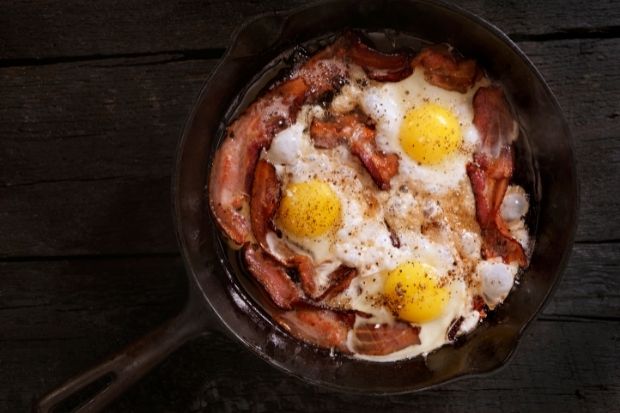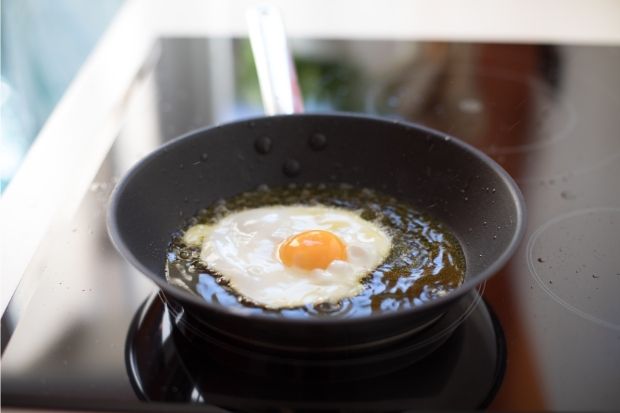Eggs are a popular food that most people love. They’re a decent source of protein and there are many ways you can prepare them as part of a delicious breakfast. Whether you like them fried, scrambled, poached or boiled, you often need some type of oil or fat in order to prepare them the right way.
Most people use butter, but you can cook eggs without butter.
There are numerous fats and oils you can use to cook eggs without butter, including canola, sunflower and olive oil, or you can even use cooking sprays.
Scrambled Eggs Without Butter

Scrambled eggs do well with butter because butter provides an easy way for the eggs to cook without sticking to the pan. There are two reasons to use an oil of some type when you’re cooking eggs: to give the eggs a little more flavor, and to prevent the eggs from sticking. If you choose the right type of oil or fat, you’ll have tasty eggs that don’t stick to the pan.
Let’s take a look at some of the more popular substitutes for butter:
Sunflower oil
Sunflower oil is a great butter substitute because it is gluten-free and cholesterol-free. If you’re wondering if it’s going to change the taste of the eggs, don’t worry, it won’t. In fact, sunflower oil has a very neutral taste and essentially gives the eggs no added flavor whatsoever.
Olive oil
Some people like to cook eggs in olive oil because olive oil has a low smoke point, making it perfect for cooking eggs over medium-high or medium heat. If you’re scrambling or even frying eggs with the yolk, it can add a herb-like or butter flavor to them.
Cooking spray
Many people love canola oil spray because it has a high smoke point that is good when people are cooking eggs at higher temperatures. Canola spray has a mild to neutral taste but it rarely overpowers the taste of the other seasonings you add to the eggs.
Leftover fat
If you have leftover duck or bacon fat, you can use it to cook your eggs. Bacon fat gives the eggs a smoky, distinct flavor, while duck fat has a very rich flavor and makes your scrambled eggs a lot fluffier. Duck fat can also be used to cook meat and vegetables.

Naturally, if you’re interested in pursuing a healthy diet and you’re calorie-conscious, cooking spray might be your best bet. Cooking sprays are available in many different flavors and types, and there are even ‘light’ versions of spray.
Finally, when it comes to healthy alternatives for cooking your eggs, don’t forget that you can skip the fats and oils altogether and simply choose a non-stick pan, which normally requires nothing at all except the food you’re cooking.
Does the Way You Cook the Eggs Affect If They Stick?
Of course, you can use all the oil or fat you like and still end up with eggs that stick. One of the ways that can happen is if you use heat that is too high. Whether you’re scrambling the eggs or frying them, heat at a medium setting works best if you want them to turn out just right. It will take longer to cook the eggs this way, but cooking eggs more slowly results in fluffy, creamy eggs.
You should also use the swirl-then-sweep method when cooking eggs. When you first put your eggs in the pan, swirl them around until small curdles begin to form. Afterwards, use a sweeping motion so that you end up with larger curdles that are very moist. The slower you cook your eggs, the less likely they’ll turn out dry and the less likely they are to stick. You can also turn off the heat before they actually set, then let the heat from the pan continue to cook the eggs until they’re done.
The Bottom Line
While sticky eggs do happen, you can avoid that scenario by using butter or alternatives to butter, such as canola or olive oil, certain fats, or a non-stick frying pan. Remember that certain oils and fats can add flavor to the eggs in addition to keeping the pan from sticking. Whether you’re watching your calories or not, it’s good to know that you have some options when you don’t want to cook your eggs with butter.
Do your egg yolks frequently break when you fry eggs? Learn why.
